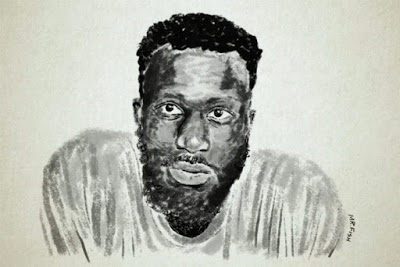America’s social hell
 |
| Chris Hedges 06/09/2020 |
This is Kabir’s America. It is our America. And our shame.
NEWARK, N.J. — Robert “Kabir” Luma was 18 when he found himself in the wrong car with the wrong people. He would pay for that misjudgment with 16 years and 54 days of his life, locked away for a crime he did not participate in and did not know was going to take place. Released from prison, he was tossed onto the street, without financial resources and, because of fines and fees imposed on him by the court system, $7,000 of debt. He ended up broke in a homeless shelter in Newark, populated with others who could not afford a place to live, addicts and the mentally ill. The shelter was filthy, infested with lice and bedbugs.
“You have to chain your food up in the refrigerator,” he said, wearing a worn, ripped sweatshirt, when I met him at the Newark train station. “There’s a chain on the door. There’s no stove. There’s one microwave that is on its way out. It stinks. I’m trying to stay positive.”
Kabir — his nickname means “big” in Arabic and was given to him in prison because of his powerful 6-foot-2-inch, 270-pound frame — lives in the netherworld of America’s criminal caste system. He is branded for life as a felon, although he was locked away for a crime that in most other countries would have seen him serve a tiny sentence or no sentence at all. He is denied public assistance, food stamps, public housing, the right to vote, the right to serve on a jury, the ability to collect Social Security for the 40-hours a week he worked in prison, barred from obtaining hundreds of professional licenses, burdened with old fees, fines and court costs he cannot pay, as well as losing the right to be free from employment discrimination because of his record.
Kabir is one of America’s tens of millions of second-class citizens, most of whom are poor people of color, who have been stripped of basic civil and human rights and are subject to legalized discrimination for life. One-third of all black men in America are classified as ex-felons. Kabir, through no fault of his own, unless being poor and black is a fault, lives trapped in a social hell from which there is almost no escape. This social hell fuels the street protests around the country as much as the outrage over indiscriminate murders by police — an average of three a day — and police violence. It is a hell visited on nearly all of those trapped in what Malcolm X called our “internal colonies.”
This hell was constructed by corporate billionaires and their lackeys in the two major political parties who betrayed the working class and working poor to strip communities of jobs and social services, rewrite laws and tax codes to amass staggering fortunes and consolidate their political and economic power at the expense of the citizenry. While they were fleecing the country, these billionaires, along with the politicians they bought and owned, including Joe Biden, methodically built brutal mechanisms of social control, expanding the prison population from 200,000 in 1970 to 2.3 million today and transforming police into lethal paramilitary forces of internal occupation. Kabir is one victim, but he is one victim too many.
I met Kabir in 2013 in a college credit class I taught through Rutgers University in East Jersey State Prison. A devoted listener to the Pacifica Station in New York City, WBAI, he had heard me on the station and told his friends they should take my class. The class, which because of Kabir attracted the most talented writers in the prison, wrote a play called Caged that was put on by Trenton’s Passage Theater in May 2018. The play was sold out nearly every night, filled with audience members who knew too intimately the pain of mass incarceration. It was published this year by Haymarket Books. It is the story of the cages, the invisible ones on the streets, and the very real ones in prison, that define their lives.


